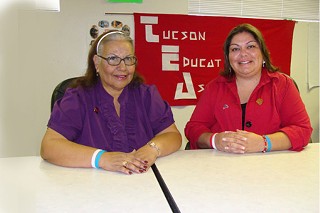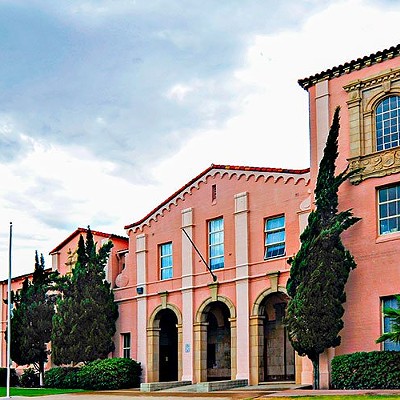When Luci Messing became president of the Tucson Education Association, there was a different Tucson Unified School District superintendent—and a different attitude.
The district, led by Elizabeth Celania-Fagen, was facing historic budget cuts and a belief that the financial nightmare handed down by the state Legislature was just beginning.
However, Messing says, everyone agreed to work together. The TUSD teachers' union agreed to hold off on salary increases and play nice while pink slips were handed out and schools went through a superintendent-mandated reorganization to find ways to attract more students—or face possible closure.
But last year, Celania-Fagen left after serving TUSD for less than two years, and John Pedicone was hired to take over. Today, that work-together attitude seems to have disappeared.
At the Tuesday, May 10, TUSD governing board meeting, Messing said that current negotiations between the union and the district have stalled. She leaves her position in two weeks, and current TEA Vice President Marivel Roybal will take the lead.
Messing asked Pedicone and the governing board if stalling negotiations is an attempt to slow down the process—because district administrators know Messing, who has 30 years of experience, will soon be replaced by Roybal, who has about 7 years of experience.
Under Celania-Fagen, the union agreed to a salary freeze while district supporters worked to pass an override election that ultimately failed.
"We're going into a fourth year of a freeze. That is not good. They can't ask us to give up more when we are already giving up so much," Messing says.
At the May 10 meeting, board member Miguel Cuevas remarked that it was unprofessional for Messing to come before the board publicly to discuss private union negotiations.
"I wouldn't be doing it if I thought the school district was negotiating in good faith," Messing says to the Weekly. "But they aren't, so where do I go from here? There is no law, but there is a mutual respect that we will not negotiate in public. I don't (think) we have gone public. I haven't shared details—just that those negotiations have stalled."
Messing says that the district is asking staff members to do more without being paid more.
"When you want something, you have to give up something," she says. "That didn't happen, so at the very beginning, we're on the defensive. Right away, we're put in the position of protecting the rights of employees."
Pedicone tells the Weekly that when early negotiations broke down last year, the union decided to pick a traditional bargaining approach to negotiations rather than a collaborative approach. The district representative involved in negotiations reports regularly to the superintendent.
"As far as I know, we are interested in moving this process forward, but as you know, the state has not put us in the best position. We are working with the same amount of money," Pedicone says.
Messing also spoke at the May 10 meeting in support of about 50 teachers being fired due to a contentious turn-around plan, which started in February, at Rincon and Palo Verde high schools. Teachers were fired and told to reapply for their jobs. Those not hired back for the next academic year still had to finish out this year.
"We told the decision-makers that the turn-around model is not the model to use. It sends the wrong message and is a great divider. Right now is not the best time to be in such division and turmoil," Messing says. "To do two major high schools at one time also seemed ridiculous."
Messing says there are a number of issues that compelled the union to file a grievance, beyond firing teachers and asking them to continue working. Messing says the TEA could even file a discrimination lawsuit.
"None of the teachers had gone through their evaluation process yet," Messing says. "That's one reason we filed a grievance. But if we discover, as we go through the list of teachers who were fired, that many are older and possibly close to retiring, that will be enough to file an age-discrimination lawsuit."
Messing says that the district did not follow the correct protocol while firing the teachers.
"We have a profile of which teachers can be cut. That wasn't followed. ... It violates our process and our agreement with the district," Messing says.
At almost every TUSD governing board meeting since the turn-around process began, teachers from Rincon and Palo Verde have pleaded for their jobs and shared desperate stories about depression and financial issues.
Messing says a collaborative approach would have worked better in making changes at Rincon and Palo Verde. A similar turn-around approach was used in Chicago, Messing says, and while it seemed to make a difference in the beginning, after the first year, improvements were negligible.
"Meanwhile, they've done nothing to help (TUSD's fired) teachers. We had a meeting (with teachers) and gave them the information on mental health, and told them we filed a grievance and what we were doing on their behalf," Messing says. "It just seems like such a wrong way to treat our employees when you didn't have to."
Messing says, in Pedicone's defense, that the turn-around plan existed before he was hired. However, she says administrators should have looked at several important figures more closely. While some stats may have put the high schools in the lower 5 percent of state schools, things were improving. For example, Messing says Palo Verde High School was the only school in the district that made annual yearly progress, and math AIMS scores at both schools had increased.
Messing is also concerned that some of the teachers fired from Palo Verde may have been blackballed for complaining about administrative issues in the past.
Another issue is morale, with district employees wondering: What schools will be next?
"Next year, Dr. Pedicone needs to go on record that he will do things differently," Messing says. "Someone needs to now look at the big picture in TUSD administration. They need to understand that right now, your employees don't trust the district."
Pedicone replies that there will be no turn-around model used in TUSD next year. Instead, Pedicone says, district staff members are working with principals and teachers right now to make schools better next year.
"It really was a hard decision to make," Pedicone says about the turn-arounds, "and it hurt our relationship with the TEA."














